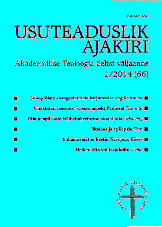Traditsiooni konstrueerimine – tuhastusmatus Eestis
Construction of Traditions: Cremation Ceremonies in Estonia Today
Author(s): Marju Kõivupuu, Aliis KiikerSubject(s): Christian Theology and Religion
Published by: Akadeemiline Teoloogia Selts
Keywords: religious studies; ethnology
Summary/Abstract: This article will dissert customs and behaviour considering cremation in context of changes in Estonian society and mentality, which has affected death culture and funeral customs. Cremation, as we understand it nowadays, originates from the end of the 19th century Europe, where a crematory was opened in Rome in 1887. The first cremation took place a couple of years later, in 1889. Thus, cremation is well accepted in Europe, but in Estonia cremation ceremony can be understood as a relatively new development in funeral traditions, being circa a couple of decades old. Cremation has considerably altered the clerical and secular funeral traditions, and consequently the appearance of cemeteries has changed (e.g., burial places have become smaller for urns need not much space) and so have funeral customs. In today’s society, the funeral customs, including cremation, are largely influenced by the so-called mass-culture. Incineration funerals are not regulated due to lack of interest by the authorities. Therefore, the urn and its handling are considered to be a delicate topic: only the family of the deceased are entitled to be concerned with funeral rites. Cremation is constantly an actual issue in Estonian (social) media, as much as religious, pragmatic, emotional and other questions regarding cremation are discussed. People often ask for advice whether to incinerate their deceased relative or how tobehave when facing such a situation. As stated in this article, the ancient customs passed on through generations serve no longer as a good example.
Journal: Usuteaduslik Ajakiri
- Issue Year: 2014
- Issue No: 1 (66)
- Page Range: 84-111
- Page Count: 28
- Language: Estonian

